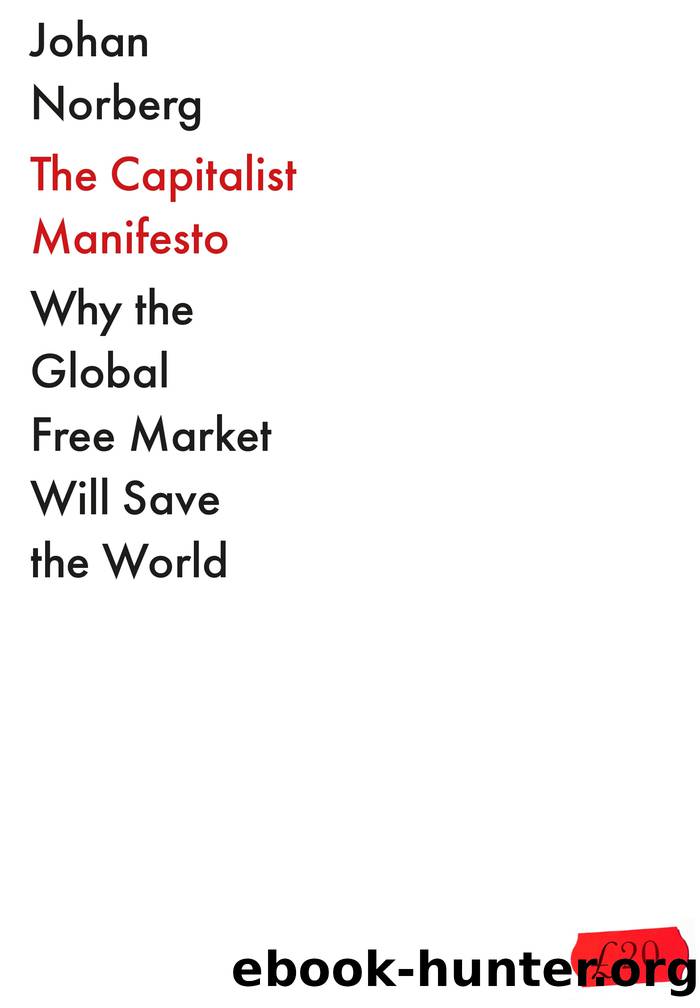The Capitalist Manifesto by Johan Norberg

Author:Johan Norberg
Language: eng
Format: epub
Publisher: Atlantic Books
Data is the new sand
One reason why lots of people think the big platforms are unbeatable is the misconception that data itself is what is valuable. However, data is not âthe new oilâ but the new sand. Sand is not very valuable in itself. But if you refine it properly (to silicon), you can create the most powerful productive power we have (the data chip). So it is with data. Since the breakthrough of the web and digitization, we have been living with a surplus of information, just about everywhere. In itself, it has as little value, but if you refine, analyse and assort it you can find new information and matches that allow you to help others to find what they are looking for in a lucrative way. And that takes tremendous effort, massive investment and constant innovation.32
This means that no one has an impregnable lead just because they sit on a pile of data, as Joakim Wernberg explains in a fascinating study of digital paradoxes.33 It can even be the other way around. Of course, there are economies of scale that allow companies to create better services at a lower price if they have a large market â and in that case it is good for consumers if companies are allowed to grow to that size; thatâs how we reap these benefits â but there are also diseconomies of scale that set a limit to companiesâ expansion. Since a large part of their value is created by intellectual and individual matchmaking, a platform can become too crowded and noisy. When everyone is there, it can be harder to find the person you are looking for. You get unintended consequences such as the young not wanting to share a platform with their parents, and dating apps that become too general and insipid. Then the demand arises for something more narrow and exclusive that better expresses oneâs individuality or one particular slice of it, and makes it possible to find like-minded people or more particular results.
Therefore, one should not expect the competition to come from another giant that offers a similarly broad platform (itâs also not obvious what users would gain from having two Facebooks) but from many smaller and more niche platforms. There is another interesting implication. The innovation shadow is real. Large companies can invest more in small, incremental improvements and they can quickly imitate smaller rivals. This means it pays less for venture capitalists and entrepreneurs to invest in areas where the elephants are already dancing. But Joakim Wernberg thinks this is counter-intuitively a good thing. It means that large resources are not wasted on things that are similar to what we already have, but are channelled into areas for radical and subversive innovation that cannot easily be incorporated into existing business models. Something that will enrich us all more than having a second Facebook or a slightly bolder set of emojis.
One way for market leaders to continue to stay on top for a while longer is to buy small, innovative companies â from YouTube and Instagram to Oculus and DeepMind.
Download
This site does not store any files on its server. We only index and link to content provided by other sites. Please contact the content providers to delete copyright contents if any and email us, we'll remove relevant links or contents immediately.
International Integration of the Brazilian Economy by Elias C. Grivoyannis(111059)
The Radium Girls by Kate Moore(12028)
Turbulence by E. J. Noyes(8049)
Nudge - Improving Decisions about Health, Wealth, and Happiness by Thaler Sunstein(7706)
The Black Swan by Nassim Nicholas Taleb(7129)
Rich Dad Poor Dad by Robert T. Kiyosaki(6632)
Pioneering Portfolio Management by David F. Swensen(6300)
Man-made Catastrophes and Risk Information Concealment by Dmitry Chernov & Didier Sornette(6019)
Zero to One by Peter Thiel(5802)
Secrecy World by Jake Bernstein(4753)
Millionaire: The Philanderer, Gambler, and Duelist Who Invented Modern Finance by Janet Gleeson(4478)
The Age of Surveillance Capitalism by Shoshana Zuboff(4292)
Skin in the Game by Nassim Nicholas Taleb(4248)
The Money Culture by Michael Lewis(4207)
Bullshit Jobs by David Graeber(4190)
Skin in the Game: Hidden Asymmetries in Daily Life by Nassim Nicholas Taleb(4006)
The Dhandho Investor by Mohnish Pabrai(3764)
The Wisdom of Finance by Mihir Desai(3747)
Blockchain Basics by Daniel Drescher(3582)
